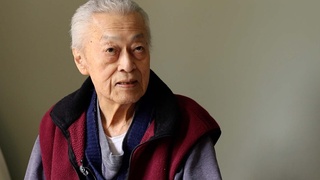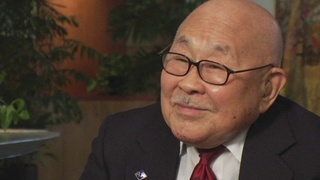Interviews
First learning about the incarceration experience in college
So I started to take some of their basic classes that introduced us to, again, issues of identity, roots, the Roots Reader, the Asian American reader had come out, exploring issues of identity and who we are and how we fit into this society. We look different, we're treated different, perhaps, when people see us, and how do we live with that and how do we break out of whatever stereotypes exist?
And aside from issues of identity, of course, issues of history. We learned about the emigration, Asian American immigration—Asian immigration to this country, learned about the treatment of Chinese, Japanese, and the various Asian, Pacific American ethnic groups. And as part of that, of course, learned about the internment of Japanese Americans. And it's the first time that I really learned about what had actually happened during the camps. After hearing references to camp just very sporadically during my youth, it was the first time that I was able to actually read about camps and see where the camps were located and what they were like and what had happened to give rise to the camps.
Date: March 23 & 24, 2000
Location: Washington, US
Interviewer: Margaret Chon, Alice Ito
Contributed by: Denshō: The Japanese American Legacy Project.
Explore More Videos

Facing housing discrimination in Rhode Island
(1934–2018) Japanese American designer, educator, and pioneer of media technologies

Adjustment to American life
(b. 1938) Japanese American. Hiroshima atomic bomb survivor

Influence of Mexican culture after returning from camp
(b. 1943) Japanese American transgender attorney

Dancing in Japan as an American, in the US as Japanese
(1918-2023) Nisei Japanese kabuki dancer

Discrimination in San Francisco
(1914–2015) Nisei YMCA and Japanese American community leader

Collection of artifacts depicting racial stereotypes influences art
(b. 1939) Japanese American painter, printmaker & professor

Encountering racial discrimination at a public swimming pool
(b. 1923) Nisei from Washington. Resisted draft during WWII.

His testimony has more credibility because of his race
(1922 - 2005) Former U.S. Army counterintelligence officer

Gender discrimination in education field
(1925 - 2018) Nisei educator from Hawai‘i

First impression of New York City during war time
(1915 - 2011) Nisei florist who resettled in New York City after WW II. Active in Japanese American civil rights movement

Teacher who helped with lisp
(b.1926) Democratic politician and three-term Governor of Hawai'i

Not bringing shame to family
(1926 - 2012) Scholar and professor of anthropology. Leader in the establishment of ethnic studies as an academic discipline

Politics in ethnic studies
(1926 - 2012) Scholar and professor of anthropology. Leader in the establishment of ethnic studies as an academic discipline

Past ties to present situation in Middle East
(1926 - 2012) Scholar and professor of anthropology. Leader in the establishment of ethnic studies as an academic discipline

Didn't have rights that whites had
(1922–2014) Political and civil rights activist.
